
Over the years, it has become fashion for Western media to “bash” on Indonesia, mainly because of its natural disasters and terroristic attacks, which have damaged the image and general perspective of the country. However, little is known about the great opportunities and potential the country have to offer, which are overshadowed by the occasional disasters.

With more than 17,000 islands, the Republic of Indonesia, located in Southeast Asia is the world’s largest archipelago and is ranked as the fourth most populous country in the world with a population of more than 237 million people. The country shares land borders with Papua New Guinea, East Timor and Malaysia. Neighbor countries include Singapore, the Philippines, Australia, and the Indian territory of the Andaman and Nicobar Islands.
Indonesia is also the most populous Muslim-majority nation, however, no reference to Islam is made in the Indonesian constitution and most Indonesian Muslims consider themselves as moderate. Indonesia is a republic, with an elected legislature and President. The current President Susilo Bambang Sudhoyono (called SBY for short by the local population), has recently been re-elected to serve the country for another 5-years term. The capital city of Indonesia, where most of the economic activities take place is Jakarta, located on the island of Java.
The Indonesian archipelago has a great history of being an important trade region since the seventh century, when the Srivijaya Kingdom started having economic exchange with China and India. After three and a half centuries of Dutch colonialism, Indonesia secured its independence after World War II. Since then, Indonesia had to face challenges posed by natural disasters, corruption, separatism, a democratization process, and periods of rapid economic change. Nowadays, Indonesia is Southeast Asia’s biggest economy and it is experiencing a great economic growth of around 6% annually and offers a lot of business opportunities for foreign investors.
Economy
Indonesia has a market-based economy in which the government plays a significant role. There are 164 state-owned enterprises and the government administers prices on several basic goods including fuel, rice, and electricity. Jakarta is the country's largest commercial center.
The services sector is the largest and represents almost half of the GDP, followed by industry representing 40.7% and agriculture with 14.0%. However, agriculture employs more people than other sectors, accounting for 44.3% of the 95 million-strong workforce, followed by the services sector (36.9%) and industry (18.8%). Major industries include petroleum and natural gas, textiles and mining. Major agricultural products include palm oil, rice, tea, coffee, spices and rubber.
Indonesia’s main export market is Japan followed by the United States, China and Singapore. The major suppliers of imported goods are Japan, China and Singapore. The country has extensive natural resources, including crude oil, natural gas, tin, copper, and gold. Indonesia's major imports include machinery and equipment, chemicals, fuels, and foodstuffs.
Main Sectors
Agriculture, livestock and fisheries
According to Mr. Achmad Mangga Barani, Director General for Estate Crops Production of Ministry of Agriculture, Indonesia has some of the best land in the world for plantation crops such as palm oil and rubber. Since 2007, Indonesia became the world’s leading producer of palm oil, while other crops like rubber, sugar, cotton, etc. also benefitted from rising commodity prices and an increase of international interest. “Indonesia is a country that is profitable to invest in the estate crops sector. In the future, estate crops will offer great opportunities, especially for palm oil.” he mentioned in the interview.
Agriculture supports the livelihood of millions of Indonesians. Three out of five Indonesians live in rural areas and farming is their main occupation. While Indonesian agriculture has performed well historically and contributed to a significant growth with increased employment and reduction of poverty, productivity gains of most crops have now slowed down significantly and the majority of farmers operate in less than one-half hectare today.
Revitalizing the agricultural sector is necessary to underpin renewed and robust growth of the economy and is a key component of the Government’s rural development strategy.
Energy & Mining
The energy sector is a major source of foreign exchange and one of the most important sectors in Indonesia, generating nearly 30% of the government’s total revenues. The country has the largest natural gas reserves in the Asia-Pacific region and produces about 1.38 million barrels of oil and 190.2 billion cubic feet of natural gas per day. Indonesia was the only Asian member of the Organization of Petroleum Exporting Countries (OPEC) outside of the Middle East until 2008 and is currently a net oil importer.
The state owns all petroleum and mineral rights. Foreign firms participate through production-sharing and work contracts. Oil and gas contractors are required to finance all exploration, production and development costs in their contract areas and they are entitled to recover operating, exploration, and development costs out of the oil and gas produced.
Indonesia's fuel production has declined significantly over the years, because of the aging of the oil fields and the lack of investment in new equipment. As a result, companies are looking for opportunities in alternative energy resources, such as geothermal. According to Director General for Oil and Gas, Ms. Evita Legowo, Indonesia has about 40% of the world’s geothermal energy, which offers a great potential.
Indonesia has one of the world's largest deposits of coal, copper, tin, nickel and gold and wants to earn more from the sector, especially because the strong demand from China and India is increasing prices to record levels. In the last ten years there has been very little foreign investment in the mining sector, especially for hard rock mining. All the new projects undertaken by foreign mining companies in the last ten years have been under the work contract legislation issued before 1998.
Indonesian mining sector is in full production and is rapidly expanding. For this reasons there are significant investment opportunities for the supply of mining equipment and technology.
Tourism
The most well-known tourism attraction of Indonesia is the island Bali, which attracts thousands of tourists yearly from Australia, Asia, Europe, the US, Middle-East, etc. However, only few people are aware of the yet untapped and unexplored sightseeing. “Indonesia has more than 17,000 islands and a great variety of cultures and languages. It is our job to improve the accessibility of these destinations and to create awareness”, says Mr. Firmansyah Director General of Destination Development.
About 5 million foreign tourists have visited Indonesia annually since 2000. Tourism in Indonesia is currently overseen by the Ministry of Culture and Tourism. International tourist campaigns have been focusing largely the diversity of the country, such as the tropical destinations with diving, cultural and eco-tourism possibilities.
Cultural tourism is a growing segment. Yogyakarta and Minangkabau and Toraja, Prambanan and Borobudur temples are popular destinations for cultural tourism, as well as many Hindu festivities in Bali.
Education
The fact that Indonesia is a booming country has also been notified by world-class universities. Many universities from oversees come to Indonesia to look for possible partnerships, such as exchange programs, joint studies and other collaborations.
Indonesia has almost 3.000 higher institutions out of which 83 are public institutions controlled by the government. Indonesia has some very high quality universities, says Dr. Jasli Falal, the Director General of Higher Education. Some of the best universities include the Bandung Institute of Technology, the Gadjah Mada University and the University of Indonesia.
Even though Indonesia has a large Muslim population, there are several universities based on different religions, such as the Parahyangan Catholic University and the Maranatha Christian University, both located in Bandung, West Java. Students and lecturers are totally accepted and welcomed at all universities, regardless their religions.
Not only universities from all over the world recognize the opportunities the Indonesian education sector has to offer. When US State Secretary Mrs. Hillary Clinton visited Indonesia in February 2009, she emphasized on the need of more cooperation between American and Indonesian universities by stimulating partnerships and increasing Fulbright scholarships.
Health
Just as in the education sector, more and more hospitals and clinics are looking for partnerships and collaborations overseas. The government is doing great efforts in order to make health care more accessible in the remote areas.
"Of course we want new partnerships that benefit Indonesia." stated Endang Rahayu Sedyaningsih the new Minister of Health.
Foreign investment is fairly common in major Indonesian cities like Jakarta, Surabaya, Java, and Bali. Jakarta has been the center of foreign investment hospitals, as it is the center of economic activities in Indonesia. At least five hospitals are owned or managed by foreign firms and individuals within Jakarta, Indonesia’s capital city. Surabaya and Medan have also attracted foreign investors as the cities have huge upper-class market potential. Bali and West Nusa Tenggara are also objects of interest to investors as those are the areas where tourism plays a great role in the economy.
USA – Indonesia Relations
The relation between the US and Indonesia is often considered as an example that the West can have a good relation with the Muslim world. Both governments are very keen on improving relations, which is proven by President Obama’s promise to visit Indonesia in the first half of 2010.
The United States has important economic and commercial interests in Indonesia.
Relations between Indonesia and the U.S. are positive and have advanced since the election of President Yudhoyono in October 2004. The U.S. played a role in Indonesian independence in the late 1940s and appreciated Indonesia's role as an anti-communist bulwark during the Cold War. Cooperative relations are maintained today, although no formal security treaties bind the two countries.
The United States and Indonesia share the common goal of combating terrorism, maintaining peace and stability in the region. Cooperation between the U.S. and Indonesia on counter-terrorism has increased steadily since 2002, as terrorist attacks in Bali (October 2002 and October 2005), Jakarta (August 2003 and September 2004) and other regional locations demonstrated the presence of terrorist organizations, principally Jemaah Islamiyah, in Indonesia. The United States has welcomed Indonesia's contributions to regional security, especially its leading role in helping restore democracy in Cambodia and in mediating territorial disputes in the South China Sea.
What is new in the Asian policy of U.S. President Barack Obama is the recognition of Indonesia as a fresh player in the U.S. global strategy. This democratic nation with the world’s largest Muslim’s population will play a crucial role in the continued stability and prosperity of the ASEAN region.


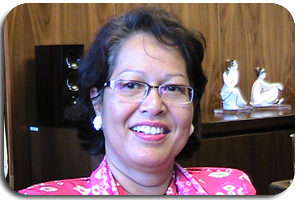 H. E. Mrs. Adiyatwidi Adiwoso AsmadyAmbassador of Indonesia to SpainEmbassy of Indonesia to Spain
H. E. Mrs. Adiyatwidi Adiwoso AsmadyAmbassador of Indonesia to SpainEmbassy of Indonesia to Spain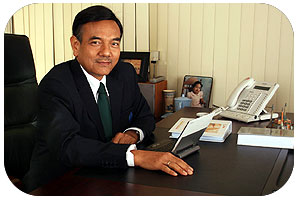 Dr.Ir.H. Suharyadi, MSRectorMercu Buana University
Dr.Ir.H. Suharyadi, MSRectorMercu Buana University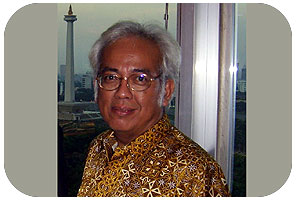 Firmansyah RahimDirector General of Tourism Destination DevelopmentMinistry of Tourism
Firmansyah RahimDirector General of Tourism Destination DevelopmentMinistry of Tourism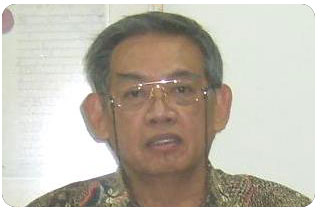 Prof. Wibisono HardjopranotoRectorUniversity of Surabaya
Prof. Wibisono HardjopranotoRectorUniversity of Surabaya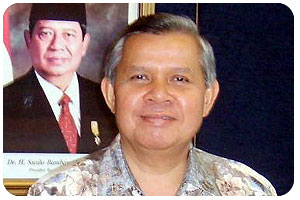 Dr. Fasli JalalDirector General of Higher EducationN/A
Dr. Fasli JalalDirector General of Higher EducationN/A Prof. Sunaryo KartadinataRectorIndonesian University of Education
Prof. Sunaryo KartadinataRectorIndonesian University of Education Stephen RinaldyOwnerPrismagraphia
Stephen RinaldyOwnerPrismagraphia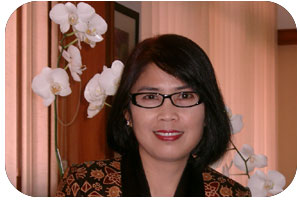 Prof. Tian Belawati RectorN/A
Prof. Tian Belawati RectorN/A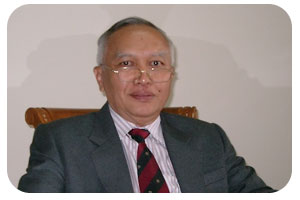 Dr. Ir. Paulus Wiryono PriyotamtamaRectorSanata Dharma University (USD)
Dr. Ir. Paulus Wiryono PriyotamtamaRectorSanata Dharma University (USD)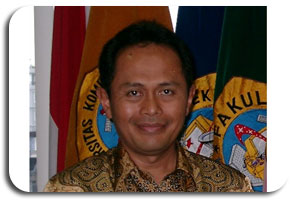 Dr. Ir. Eddy Soeryanto SoegotoRectorUNIKOM
Dr. Ir. Eddy Soeryanto SoegotoRectorUNIKOM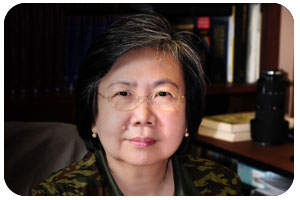 Ms Cecilia LauwRector of Parahyangan Catholic UniversityParahyangan Catholic University
Ms Cecilia LauwRector of Parahyangan Catholic UniversityParahyangan Catholic University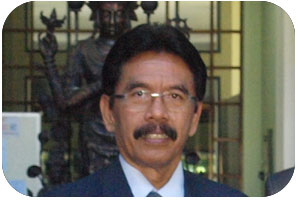 Prof. Dr. Ir. Yogi SugitoRectorUniversity of Brawijaya
Prof. Dr. Ir. Yogi SugitoRectorUniversity of Brawijaya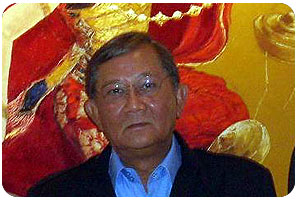 Mr. Putera SampoernaFounderSampoerna Foundation
Mr. Putera SampoernaFounderSampoerna Foundation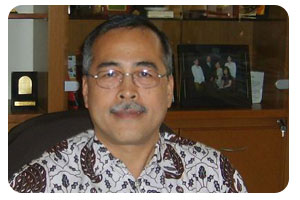 Prof. Dr. Ir. Hasian Parlindungan Septoratno SiregarRector of Maranatha Christian UniversityN/A
Prof. Dr. Ir. Hasian Parlindungan Septoratno SiregarRector of Maranatha Christian UniversityN/A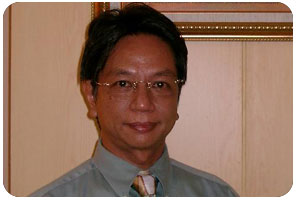 Dr. Monty SatiadarmaRectorTarumanagara University
Dr. Monty SatiadarmaRectorTarumanagara University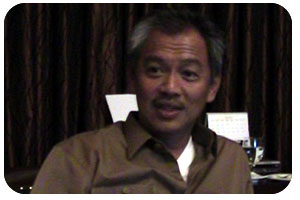 Mr. Tomy WinataChairmanArtha Graha Network
Mr. Tomy WinataChairmanArtha Graha Network Artha Graha Network – Artha Graha PeduliGroups
Artha Graha Network – Artha Graha PeduliGroups PT Indonesia Ferry (Persero)Transport
PT Indonesia Ferry (Persero)Transport TRAC - Astra Rent a CarTransport
TRAC - Astra Rent a CarTransport PT. Perkebunan Nusantara VIIIForestry & Agriculture
PT. Perkebunan Nusantara VIIIForestry & Agriculture PT. Perum PerhutaniForestry & Agriculture
PT. Perum PerhutaniForestry & Agriculture PT. Perkebunan Nusantara IIIForestry & Agriculture
PT. Perkebunan Nusantara IIIForestry & Agriculture PT Ratu Prabu Energi TbkEnergy & Mining
PT Ratu Prabu Energi TbkEnergy & Mining PT. Gunanusa Utama FabricatorsEnergy & Mining
PT. Gunanusa Utama FabricatorsEnergy & Mining PT. TIMAH (PERSERO) TBK.Energy & Mining
PT. TIMAH (PERSERO) TBK.Energy & Mining Bogor Agricultural UniversityEducation
Bogor Agricultural UniversityEducation Maranatha Christian UniversityEducation
Maranatha Christian UniversityEducation Sanata Dharma UniversityEducation
Sanata Dharma UniversityEducation Indonesian University of EducationEducation
Indonesian University of EducationEducation State University of MalangEducation
State University of MalangEducation Parahyangan Catholic UniversityEducation
Parahyangan Catholic UniversityEducation University of SurabayaEducation
University of SurabayaEducation